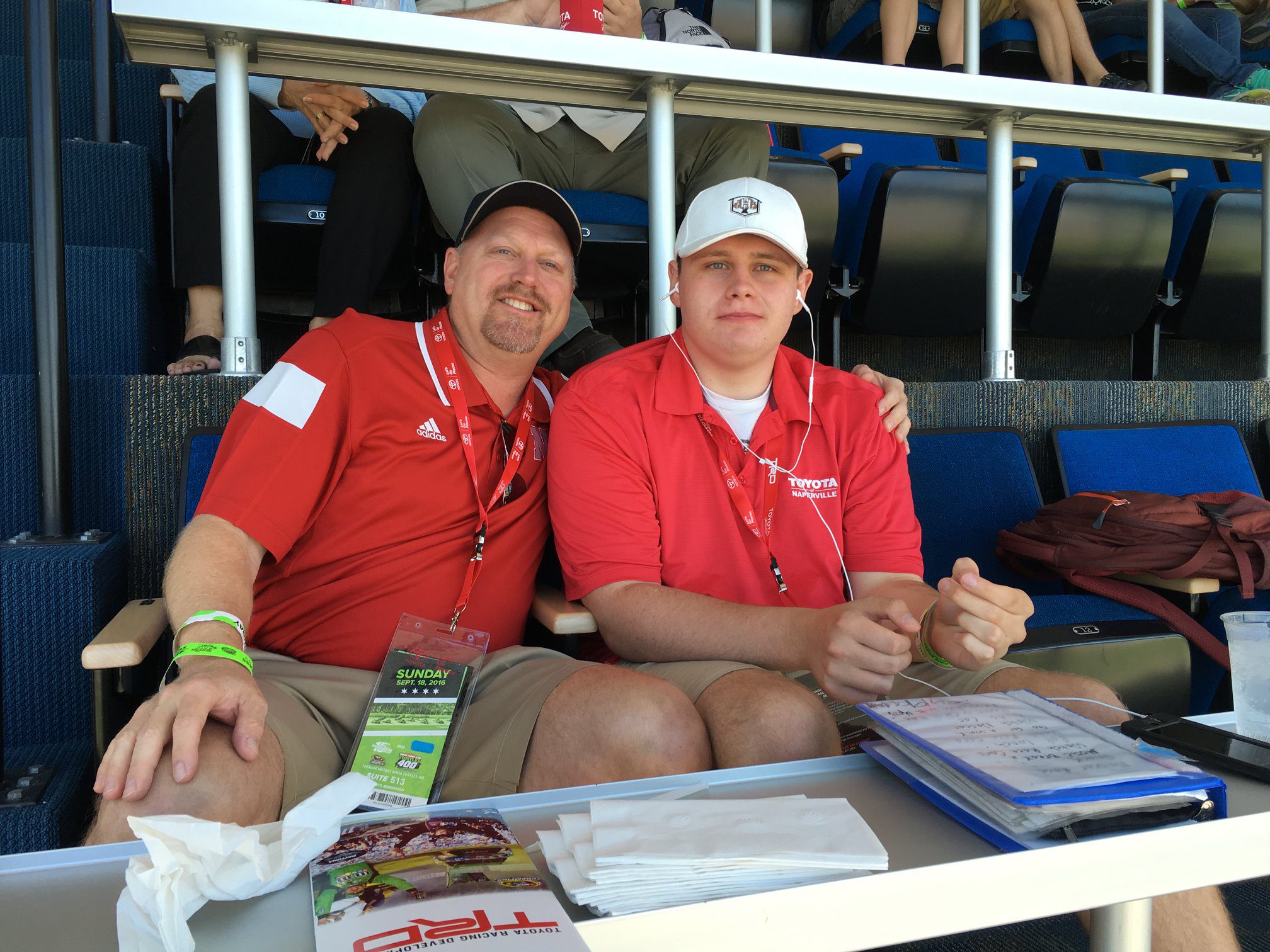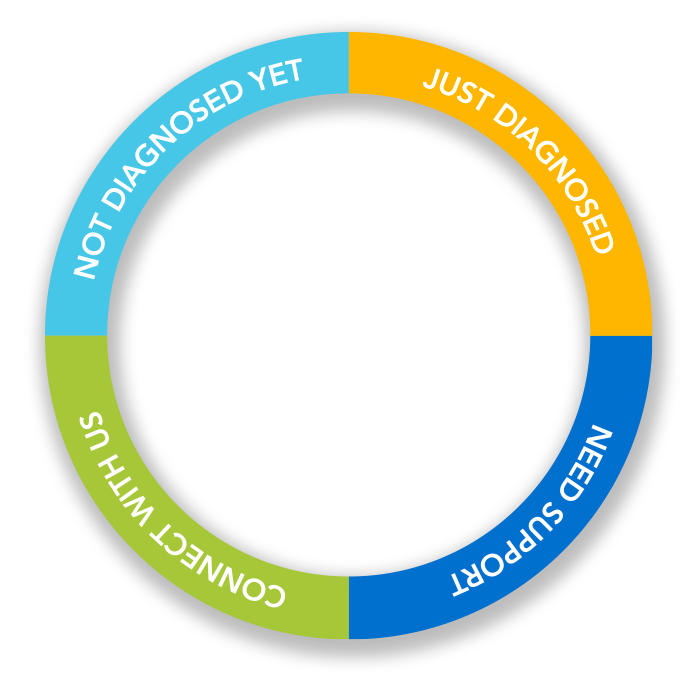We’re in this journey with you
Welcome to Turning Pointe’s resource page for families and students. If your child was recently diagnosed with autism or a developmental disability, our glossary page can walk you through unfamiliar terms; and our resource box has a wealth of information from local, state and national entities. We are here to help and our staff is at the ready to share knowledge and help navigate this with you.
Diagnosis
Evaluating your child and finding the proper diagnosis is the first step in the journey with autism. Visit our list of resources to help guide you in this process.
School Support
Education is an incredibly important aspect to development and overall well-being. Here you will find resources for educational advocacy as well as tutoring and executive function support.
Health & Medical
We are here to help support you in all aspects of life, including health and medical. Here you can find resources to help you and your family live their healthiest lives.
Therapies
Finding the right therapy team can be an overwhelming process. Here you will find a list of organizations that provide a variety of services to help start you in this journey.
Social Stories
Social Stories can help prepare your child for different scenarios and set up expectations. We have created a variety of Social Stories that you can download and use at home or on the go!
Financial Support
We understand that therapies and additional services can be expensive. To find resources for financial support and grant opportunities.
Parent Education & Support
Autism is tough to navigate but we want you to be well informed. We’ve provided knowledge-based links to programs that provide educational opportunities, parent support groups, and legal support.
Young Adult Support
Young adults with autism deserve specialized support for their unique adult needs. Click here for resources that assist with employment, socialization, and goal support.
Socialization
Socializing is a common challenge for those with autism. These resources provide you with opportunities to connect with others both virtually and in person
If you would like to connect with Turning Pointe Autism Foundation’s Family Specialist, you can contact Mary at mbutler@turningpointeaf.org or (630) 615-6036
Diagnosis
Konick & Associates:
https://www.konickandassociates.com/neuropsychological-autism-testing
Westside Children’s Therapy:
https://westsidechildrenstherapy.com/diagnostic-testing/
Behavioral Perspective:
https://bpiaba.com/services/ados/
Easterseals:
Pathways Psychology Services:
https://pathways-psychology.com/psychological-testing-therapy/
CDC:
https://www.cdc.gov/ncbddd/autism/screening.html
As You Are – Virtual Autism Diagnostic Evaluation for Kids:
Young Adult Support
Konick & Associates:
https://www.konickandassociates.com/game-night-group
Autism Workforce:
Ferrari Resource Group:
http://www.ferrariresourcegroup.com/
Parent Alliance Employment Project:
https://www.parents-alliance.org/page/home
Disability:IN:
COD Autismerica:
https://www.cod.edu/autismerica
Pathways Psychology Services:
https://pathways-psychology.com/young-adult-transitions-group-starting-at-pathways/
Financial Support
Chicago Autism Network:
https://www.chicagoautismnetwork.org/
United Children’s Foundation:
Supplemental Social Security Income:
https://www.ssa.gov/benefits/disability/apply-child.html
Healthwell Foundation:
https://www.healthwellfoundation.org/fund/pediatric-assistance/
Autism Care Today:
https://www.act-today.org/apply-for-grant//
Autism Hero Project:
Therapies
Little Friends:
https://www.littlefriendsinc.org/therapeutic-services
Autism Service Provider and Beyond:
https://www.autismserviceprovider.com/services
By Your Side:
https://byyoursideac.com/services/
Songbird Care:
Konick and Associates:
https://www.konickandassociates.com/autism-spectrum-disorders
Westside Children’s Therapy:
https://westsidechildrenstherapy.com/
Behavioral Perspective:
Emergent Learning Center:
https://www.emergentlearningcenter.com/services
Easterseals:
https://www.easterseals.com/dfv/our-programs/autism-asd-services/
Autism Therapy Group:
https://atgtogether.com/aba-therapy/
Blue Bird Day:
https://bluebirddayprogram.com/services/
Kids First Collaborative:
https://kidsfirstcollaborative.com/clinical-counseling-services
Pathways Psychology Services:
https://pathways-psychology.com/autism-aspergers-counseling/
School Support
Beyond Booksmart:
https://www.beyondbooksmart.com/
Wanda Malone:
https://wandamaloneeducationalservices.com/
Bridge Educational Advocacy:
Kids First Collaborative:
https://kidsfirstcollaborative.com/services-for-families
ACES Education – Jane Marcoux:
https://togetherwelearnbetter.com/
Arc of IL :
Parent Education & Support
Autism Service Provider and Beyond:
https://www.autismserviceprovider.com/services
Clancy & Associates:
https://www.clancyassociates.com/
Autism Speaks Resource:
https://www.autismspeaks.org/resource-guide
Blue Bird Day:
https://bluebirddayprogram.com/our-resources/
Chicago Autism Network:
https://www.chicagoautismnetwork.org/workshops
Rush Autism Resource:
https://www.rush.edu/services/autism-care/autism-resource-directory
Kids First Collaborative:
https://kidsfirstcollaborative.com/clinical-counseling-services
Emergent Learning Center:
https://www.emergentlearningcenter.com/services
Easterseals DuPage & Fox Valley:
https://www.easterseals.com/dfv/our-programs/autism-asd-services/
Autism Therapy Group:
https://atgtogether.com/aba-therapy/
Blue Bird Day:
https://bluebirddayprogram.com/services/
Kids First Collaborative:
https://kidsfirstcollaborative.com/clinical-counseling-services
Behavioral Perspective:
https://bpiaba.com/services/parent-academy/
Arc of IL:
Health & Medical
Rush AARTS Center:
https://www.rush.edu/locations/autism-assessment-research-treatment-services-aarts-center
Autism Speaks – Medical Conditions Associated with Autism:
https://www.autismspeaks.org/medical-conditions-associated-autism
Autism Speaks – Health Insurance Coverage:
https://www.autismspeaks.org/health-insurance-coverage-autism
Arc Family to Family Health Information:
https://www.thearcofil.org/about-us/programs/family-to-family-health-information-center/
Illinois Autism Insurance Coalition:
All Smiles Shine App:
Glossary
Acceptance and Commitment Therapy (ACT):
A form of psychotherapy that uses acceptance and mindfulness strategies with the objective of not eliminating negative feelings, but accepting them and moving towards being fully present in the moment.
Americans with Disabilities Act (ADA):
A civil rights law that prohibits discrimination based on a disability.
Annual IEP Meeting:
Each year, the IEP team will come together to review goals and accommodations – an assessment is not done for an annual meeting.
Antecedent:
The event, action, or circumstance that exists immediately before a behavior.
Applied Behavior Analysis (ABA):
A scientific approach to understanding and establishing behaviors. It is an evidence-based best practice that addresses how behavior works, how behavior is affected by the environment, and how learning takes place.
Assessment:
The identification of a child’s needs, strengths, and concerns to determine what services are needed. Professionals make initial assessments as well as assessments throughout services to monitor progress.
Assistive and Augmentative Communications (AAC):
Additional materials, supports, and electronic devices that help people communicate.
Associative Play:
When children are playing side-by-side with each other, sometimes engaging, but don’t have a combined goal. For example, two children painting at a table and talking to each other, but working on their own art.
Audiology:
The study of hearing, balance, and related disorders.
Autism Diagnostic Interview – Revised (ADI-R):
A structured interview conducted with the parents of a child being assessed for autism to obtain the child’s full developmental history.
Autism Diagnostic Observation Scale (ADOS):
A protocol for assessing and diagnosing autism using a series of tasks that involve social interaction between the assessor and the child.
Autism Spectrum Disorder (ASD):
A developmental disability that can cause social, communication, and behavioral challenges. A diagnosis of ASD now includes conditions that used to be diagnosed separately: autistic disorder, pervasive developmental disorder not otherwise specified (PDD-NOS), and Asperger syndrome. These conditions are now all called autism spectrum disorder.
Baseline Data:
Measurement of a behavior or skill before intervention takes place. This data is helpful in measuring progress.
Behavior Intervention Plan (BIP):
A plan developed after a functional behavioral assessment (FBA) that describes the behavior and includes positive behavioral supports.
Board Certified Behavior Analyst (BCBA):
A professional who has a masters degree, completed 1500 hours of applied behavior analysis fieldwork, and passed a competency exam through the board.
Child Find:
A federal law that states public schools must look for, find, and evaluate children who need special education services. It covers children ages birth through 21 and applies to all children, including those who are homeschooled, in private schools, and are migrants.
Cognitive-behavioral therapy (CBT):
A type of psychotherapy in which negative thought patterns are challenged to improve mental health and promote emotional regulation.
Cognitive:
A term that describes the mental processes of knowing, perceiving, remembering and reasoning.
Comorbidity:
The simultaneous presence of two chronic conditions. Many things are often comorbid with autism, including epilepsy and obsessive-compulsive disorder (OCD).
Compulsions:
Repetitive behaviors or mental actions that an individual feels driven to perform and complete.
Cooperative Play:
When children are playing together with a common goal or purpose. For example, children playing with Legos to build one city together.
Crisis Documentation Parent Notification Form:
In accordance with the Illinois School Board of Education, a form must be completed and parents must be notified within 24 hours of any event involving physical restraint or time out.
Developmental Delay:
When a child has not met the developmental milestones expected of them compared to others of the same age. Delays may occur in areas of motor function, speech and language, cognitive, and/or social skills.
Developmental Disability Waiver Services:
Waivers are through the Illinois Department of Human Services and provide supports that allow individuals to remain in their own homes (support) or live in a community setting (residential). The waivers for developmental disabilities are: Children and Young Adults with Developmental Disabilities-Support Waiver, Children and Young Adults with Developmental Disabilities-Residential Waiver, and Adults with Developmental Disabilities Waiver. Individuals must be registered in the PUNS database.
Developmental Milestones:
Guidelines for when different skills, behaviors, or tasks should be developed by certain ages.
Developmental Pediatrician:
A doctor who specializes in assessing and treating children with learning, behavioral, and developmental difficulties.
Developmental, Individual Differences, Relationship-based (DIR):
A model that highlights the power of relationships and human connections to encourage development.
Diagnostic and Statistical Manual (DSM-5):
The official system for classification of psychological and psychiatric disorders prepared by and published by the American Psychiatric Association.
Discrete Trial:
A structured way of teaching in simple steps. A task is broken down and taught in steps and then built back up to the entire task. Discrete trial is used in ABA therapy.
Domain IEP Meeting:
The first meeting to take place in determining an IEP. It takes place before any assessment or evaluation begins.
Dynamic Learning Maps Assessment (DLM):
An assessment for students with significant cognitive disabilities for whom general state assessments are not appropriate. DLM assessments offer a way for these students to show what they know and can do in English language arts, mathematics, and science.
Early Intensive Behavioral Intervention (EIBI):
ABA based interventions that focus on very young children with ASD, usually younger than five and often younger than three.
Early Intervention (EI):
A statewide program that provides support and services for families to help their children under age 3 meet developmental milestones.
Echolalia/Scripting:
Repeating of words or phrases. It may occur immediately after hearing the word or phrase, or much later. It could be “functional”, meaning the words and phrases are used appropriately or “nonfunctional”, meaning the words and phrases don’t seem to have meaning.
Eligibility Determination IEP Meeting:
The meeting that takes place after all evaluations are complete. The team will come together to discuss recommendations for services.
Elopement:
To leave without permission or without processing the dangers and risks involved in leaving.
Executive Function:
Mental skills that include memory, flexible thinking, and self-control. Trouble with executive function can make it hard to focus, follow directions, handle emotions, complete tasks, and more.
Expressive Language:
The “output” of language, expressing wants and needs through verbal and nonverbal communication.
Extended School Year (ESY):
Special education and related services that are provided to a child with a disability beyond the normal school year at no cost to the parents of the child.
Feeding Therapy:
An intervention provided by trained Occupational Therapists or Speech Language Pathologists that helps children learn how to eat or eat better.
Fine Motor Skills:
The coordination of the smaller muscles of the hands. Tasks like using a pencil, building with legos, and stringing beads all require fine motor skills.
Floortime:
A specific technique that uses the DIR model and follows the child’s natural emotional interests. It often takes place on the floor and emphasizes the role of parents and other family members.
Free Appropriate Public Education (FAPE):
A federal law that guarantees the right to free appropriate public education to kids with disabilities. It requires schools to provide special education to meet the specific needs of a child, including services such as speech therapy, counseling, accomodations, and an Individualized Education Plan.
Functional Behavioral Assessment:
A process in which problem behaviors are analyzed and the functions (purposes) of the behavior are identified. Includes documenting the ABC – antecedent (action/event prior to behavior), behavior, and the consequence. Then an individualized behavior intervention plan (BIP) is developed.
Functional Play:
The appropriate use of objects in play, like rolling a car or brushing a doll’s hair with a brush.
Gross Motor Skills:
Coordination of the larger muscles of our abdomen, legs, and arms such as running, throwing a ball, and climbing stairs.
Idiosyncratic Speech:
When someone uses words or phrases but with a different meaning than what the word or phrase is typically used for. Idiosyncratic speech makes sense to the speaker and often those closely involved with the speaker.
Impulsivity:
To act with little to no consideration of consequences.
Independent/Solitary Play:
When a child plays alone with little to no attention to other children or adults in the room. Children with autism tend to stay in this phase of play longer than neurotypical children.
Individual Service Plan (ISP):
Children who attend a private school will not have an IEP like they would in the public school system for special education. Instead, they may have an ISP which can look similar to an IEP, but the services may be fewer than in a public school.
Individualized Education Plan (IEP):
A plan that identifies the student’s specific learning expectations and outlines how the school will address these expectations through appropriate special education programs and services.
Individualized Family Service Plan (IFSP):
A plan created between the parents of a child and early intervention professionals to outline services and goals for the child’s development.
Individuals with Disabilities Education Act (IDEA):
Law that ensures that all children with disabilities are entitled to a free appropriate public education (FAPE) to meet their unique needs and prepare them for further education, employment, and independent living.
Joint Attention:
When someone uses eye gaze, gestures, sounds or words to get another person’s attention, followed by both people focusing on the same thing while also engaging with each other.
Least Restrictive Environment (LRE):
A principle that guides a child’s education program by maintaining that students in special education should be in the same classrooms as other students as much as possible. It will look different for each student as it will fit their unique needs.
Life Skills:
Skills needed to perform everyday functions and tasks, such as personal hygiene, toileting, self feeding, self dressing, etc.
Mainstreaming/Inclusion:
The placement of an individual with special needs in a general education classroom.
Multi-Tiered System of Supports (MTSS):
Framework schools use to screen students for academic and behavioral challenges with the goal of intervening early and providing targeted support to struggling students.
Neurodivergent (ND):
A term for people whose brains function differently in one or more ways than is considered standard or typical. People with ASD are considered neurodivergent.
Neuropsychological Testing:
An assessment of how one’s brain functions and how that relates to behavior and emotions. A number of areas are evaluated such as intelligence, executive function, attention, memory, language, and more. It can be used to diagnose ASD as well as other disorders.
Neurotypical (NT):
A term for people whose brains function in a way that is consistent with what most people would perceive as normal.
Nonfunctional Routines:
Repeated actions or behaviors that appear to not have a purpose.
Nonverbal Behaviors:
Actions that convey information without the use of speech such as eye gaze, facial expressions, body posture, and gestures.
Occupational Therapist:
A professional who specializes in occupational therapy.
Occupational Therapy:
An intervention that assists in the development of life skills and fine motor skills. Interventions may focus on sensory issues, coordination of movement, and balance.
Onlooker Play:
When a child observes other children playing, but does not engage in play.
Parallel Play:
When a child plays next to another child, but not with them. The children do not interact directly with each other. For example, two children in the room building blocks on their own and not talking to each other.
Perseveration:
Repetitive movement or speech, or sticking to one idea or task, which has a compulsive quality to it.
Physical Restraint:
In Illinois regulations, a physical restraint is defined as holding a student or otherwise restricting the student’s movements. It includes only the use of specific, planned techniques to prevent a student’s movement which is only allowable in the event the student presents an imminent danger of serious physical harm to self or others. Physical restraints shall never impair a student’s ability to breathe or communicate.
Physical Therapist:
A professional who specializes in physical therapy.
Physical Therapy:
An intervention that helps enable bodily movement and increase flexibility, muscle strength, endurance, and range of motion.
Picture Exchange Communication System (PECS):
PECS is an alternative communication system that uses picture symbols. Individuals learn to use picture symbols to construct complete sentences, initiate communication, and answer direct questions.
Pivotal Response Training (PRT):
An intervention based on the principles of ABA that focuses on pivotal behaviors with a focus on motivation as well as responding to multiple cues, self-regulation, and social initiations.
Placement IEP Meeting:
Once the IEP team has decided what services are needed, they will decide where the services will be provided in the least restrictive environment. This is placement.
Pragmatic Language:
Appropriate and meaningful speech in social situations.
PRN Medication:
Medications that are given only as needed.
Professional Crisis Management (PCM):
A comprehensive, safe, and effective crisis management system. Individuals are PCM trained, with an emphasis on prevention, de-escalation, intervention, and post crisis intervention strategies.
Proprioception:
Our body’s ability to sense the position of our body parts in relation to one another and the amount of strength it takes to create movement.
Prosody:
The rhythm and melody of spoken language which uses rate, pitch, and intonation to convey the message. Children with ASD may have a hard time understanding and producing prosody.
PUNS:
A database that registers individuals who need Developmental Disability Waiver services funded by the Illinois Department of Human Services. PUNS has 2 categories: Seeking Services (category for people who currently need or desire services) and Planning for Services (category for people who do not currently want or need services but may in the future). PUNS selections are based on a person’s cumulative length of time in the Seeking Services Category. As funding is available, individuals are selected from PUNS and invited to apply for DD Waiver services.
Re-Eval IEP Meeting:
Every three years, the IEP team meets to re-assess each necessary domain. They will also determine if your child remains eligible for special education services.
Receptive Language:
The “input” of language. How one understands and processes communication.
Registered Behavior Technician (RBT):
Professional with a paraprofessional certification in behavior analysis.
Regression:
Any loss of skills or abilities.
Residential Program:
When an individual lives outside of their home and on the grounds of a residential center to receive specialized instruction, care, and services.
Resource Room:
A separate classroom or designated space where special education programming can be delivered to students according to their IEP. Students may spend some time in the resource room and the rest of the time in the general classroom.
Respite Care:
Care provided by an individual or institution to a child with a disability so that the primary caretakers, usually the parents, can have a break.
Restricted Patterns of Interest:
Limited range of interest that are intense in focus, may appear to be obsessions.
Self-Contained Room:
A smaller classroom that consists of a specific group of children who all have the same disability or can be a mixed group with different unique learning needs.
Self-injurious Behavior (SIB):
Behavior that could result in physical injury to one’s own body such as head banging, hand biting, or skin scratching.
Self-Regulation:
The ability to manage one’s emotions, behaviors, and movement despite whatever is occurring in the environment. Many children with ASD have difficulties with self-regulation.
Self-Stimulatory Behavior (Stimming):
Repetitive behavior such as spinning of objects, rocking, clapping, vocal echoes, etc that people with ASD commonly partake in to cope with overstimulation or to self-regulate.
Sensory Avoider:
Someone who overreacts to sensory input and can become easily overwhelmed by it. May also be called “hypersensitive” or “hyperreactive”.
Sensory Integration (SI):
A form of occupational therapy, this supports a person’s ability to regulate a response to sensory input.
Sensory Processing Disorder (SPD):
A neurological condition that exists when sensory signals are not adequately processed in order to appropriately respond. Many people with SPD may be highly sensitive to fabrics, food textures, lights, and/or sounds.
Sensory Seeker:
Someone who underreacts to sensory input or needs more of it to feel regulated. May also be called “hyposensitive” or “hyporeactive”.
Sensory Stimulation:
Behaviors performed to stimulate internal response. Examples are manipulating different textures or fidget toys, using weighted objects, or swinging on swings.
Social Reciprocity:
The back and forth flow of social interaction.
Social Story:
Individual short stories that depict a social situation to help those with ASD better understand different scenarios and how to respond in these situations. They can also help prepare individuals with ASD for new or unfamiliar scenarios.
Social-imitative Play:
Acting out typical actions or routines through play.
Soft Skills:
The common, core skills needed to develop more in depth skills. For example, soft skills in school include being able to sit for a period of time and follow directions in order to further engage in learning.
Special Education:
Specially designed instruction, provided at no cost to parents, to meet the unique needs of a child with a disability.
Speech Language Pathologist (SLP):
A professional who specializes in the area of communication/speech therapy.
Speech Therapy:
An intervention that focuses on areas such as understanding and use of language, feeding/swallowing, and voice.
Stereotyped Behaviors:
Excessive repetition of actions. Stimming is a form of stereotyped behavior.
Stereotyped Language:
Excessive repetition of words or phrases. Echolalia/scripting can be a form of stereotyped language, but so can other repetitive vocalizations.
Summary of Performance (SOP):
When a student is no longer eligible for special education due to graduating with a regular diploma or aging out, they will receive a Summary of Performance which is one document that summarizes all the information and data that a school system has collected on the student.
Supplemental Security Income (SSI):
An income-based federal program for individuals with disabilities.
Symbolic/Pretend Play:
When a child pretends to be something or someone else and performs actions typical of that person or thing. It is also when a child uses an object to represent something else. Examples: when a child plays “house” and pretends to be a parent or uses a banana as a telephone.
TEACCH:
A therapeutic approach based on the idea that individuals with ASD more effectively use and understand visual cues. It focuses on using items such as picture schedules to break down tasks step-by-step.
Therapeutic Day School:
A special school designed to support students who have difficulties learning in traditional school settings. The primary focus is often emotional and behavioral support.
Time Out:
In Illinois regulations, a time out is defined as a behavior management technique for the purpose of calming or de-escalation that involves the involuntary monitored separation of a student from classmates with a trained adult for only for a brief time, in a non-locked setting. A time out is only used when a student is exhibiting behavior the poses an imminent danger of serious physical harm to self or other – it does not include student-initiated or teacher-initiated breaks.
Transition Plan for IEP:
The process in helping students plan for life after high school. Transition planning must start by the time the student turns 16, but can start earlier if appropriate.
Transition:
A change from one environment or activity to another. Transitions can be difficult for a person with autism.
Vestibular System:
Our system that gives us awareness of balance and spatial orientation so we can coordinate our movements.
Visual Cues:
Written words, pictures, and/or icons that convey information in a visual way.
Medical Social Stories
Getting My Blood Drawn

- I am getting my blood drawn today. I am going to a place where doctors and nurses work.
- I will walk into the building and wait until it is time for me to get my blood drawn.
- When it is my turn, I will walk into a room and sit on a chair. I will stay still.
- While I am sitting in the chair, I can do things like watch my favorite videos, listen to music, or close my eyes. Someone can even give me a hug to help me stay still!
- The person helping me with my blood draw will put a rubberband on my arm and use their fingers to touch my skin. The rubberband will feel like a very tight squeeze. I will stay still.
- The helper will then clean my skin with a soft cloth, it will feel cold and wet.
- When it is time, I may feel a quick pinch. It is very important that I keep my arm still. The doctors need a little bit of my blood to make sure I am healthy!
- I will get a bandaid and then I am all done! I was so brave!
Tips for Parents:
- Bring highly preferred items to help distract your child.
- Call ahead of time to let them know your child has autism and ask if they have any additional support like child life specialists or pain management options to numb the skin before the poke.
- Let the phlebotomist/nurse know if they should count out loud for the poke or not. Some kids like to have a countdown and others do not.
- Remember, you know your child best! Advocate for what you think would be most helpful!

Going for a Check Up

- I am going to the doctor today. There are a few things they will do to make sure I am healthy. I will be okay.
- I will walk into the building and wait until it is time for me to see the doctor.
- When it is my turn, a nurse will help see how big I am! I will stand on a scale to see how much I weigh and then I will stand up straight to see how tall I am.
- Then I will go into the room and sit on the doctor table or chair. The nurse will take my temperature. They will also put a wrap around my arm that will give me a tight squeeze for a little bit and then will go away. They will also put a cool light on my finger. I will stay still and I will be okay!
- The doctor will then come ask the adult with me questions. The doctor will check to make sure I am healthy by using a light to look in my eyes and ears. They will also put a cold circle on my chest and back to listen to my heart and breathing. They may also use their hands to feel my skin. I will be okay!
- When I am done, I get to go home! I was so brave!
Tips for Parents:
- Bring highly preferred items to help distract your child.
- Let the staff know about things that might be difficult for your child like lights, sounds, and touch.
- Remember, you know your child best! Advocate for what you think would be most helpful!

Having Surgery

- I am going to the hospital today to have surgery. I will walk in the hospital and tell the front desk that I am here. They will give me a bracelet to wear that has my name on it so everyone knows who I am.
- I will wait until it is my turn. When it is my turn, a nurse will help see how big I am! I will stand on a scale to see how much I weigh and then I will stand up straight to see how tall I am.
- Then I will go into the room and sit on the bed. The nurse will take my temperature. They will also put a wrap around my arm that will give me a tight squeeze for a little bit and then will go away. They will also put a cool light on my finger. I will stay still and I will be okay!
- I will change into hospital pajamas and meet my doctors. One is a sleep doctor who is in charge of my special hospital nap so I will not feel anything during surgery. The other doctor is the doctor who is in charge of my surgery. They will take very good care of me!
- If I am feeling nervous, I might drink some medicine to help me before I get my sleepy medicine. It is okay to feel scared, everyone is here to help me!
- My family cannot come with me to surgery, so I will say goodbye and go with my nurse. My family will be waiting for me.
- The sleepy doctor will give me a mask that feels soft and squishy on my face. I will take deep breaths of the sleepy medicine which is actually like sleepy air! It will not hurt.
- I will take my special hospital nap and when I wake up, my surgery will be done and my family will be with me! I was so brave today!
Tips for Parents:
- Bring highly preferred items to help distract your child
- When you receive the pre-op call, let them know that your child has autism and ask if they have any additional support like child life specialists to help.
- Some hospitals offer pre-op tours. If this is something you think would be helpful, you can ask if they offer them. Many children’s hospitals already have a specific social story for their process, you can also ask if that is an option as well!
- If your child may have a hard time separating from you to go to surgery, ask the anesthesiologist if a “pre-med” is an option.
- Many hospitals will allow a child with autism to receive anesthesia from a mask before they place an IV. If pokes are something that may be difficult for your child, you can ask if this is an option.
- If your child is receiving anesthesia through a mask, it can be smelly. You can ask if they have anything to scent it. Many hospitals have the ability to make the mask smell like cherry, bubblegum, etc.
- Let the staff know about things that might be difficult for your child like lights, sounds, and touch.
- Remember, you know your child best! Advocate for what you think would be most helpful!

Getting a Sedated MRI

- I am getting an MRI today. That means I am going to the hospital to have special pictures taken.
- I will walk in the hospital and tell the front desk that I am here. They will give me a bracelet to wear that has my name on it so everyone knows who I am.
- I will wait until it is my turn. When it is my turn, a nurse will help see how big I am! I will stand on a scale to see how much I weigh and then I will stand up straight to see how tall I am.
- The nurse will take my temperature. They will also put a wrap around my arm that will give me a tight squeeze for a little bit and then will go away. They will also put a cool light on my finger. I will stay still and I will be okay!
- I will change into hospital pajamas and meet my sleep doctor – they are in charge of my special hospital nap. I will be asleep when my pictures are being taken. They will take very good care of me!
- If I am feeling nervous, I might drink some medicine to help me before I get my sleepy medicine. It is okay to feel scared, everyone is here to help me!
- My family cannot come with me to get my pictures taken, so I will say goodbye and go with my nurse. My family will be waiting for me.
- The sleepy doctor will give me a mask that feels soft and squishy on my face. I will take deep breaths of the sleepy medicine which is actually like sleepy air! It will not hurt.
- I will take my special hospital nap and when I wake up, my pictures will be done and my family will be with me! I was so brave today!
Tips for Parents:
- Bring highly preferred items to help distract your child
- When you receive your appointment call, let them know that your child has autism and ask if they have any additional support like child life specialists to help.
- Many children’s hospitals already have a specific social story for their process, you can ask if that is an option.
- If your child may have a hard time separating from you to go to their MRI, ask the anesthesiologist if a “pre-med” is an option.
- Many hospitals will allow a child with autism to receive anesthesia from a mask before they place an IV. If pokes are something that may be difficult for your child, you can ask if this is an option.
- If your child is receiving anesthesia through a mask, it can be smelly. You can ask if they have anything to scent it. Many hospitals have the ability to make the mask smell like cherry, bubblegum, etc.
- Let the staff know about things that might be difficult for your child like lights, sounds, and touch.
- Remember, you know your child best! Advocate for what you think would be most helpful!


Naperville, IL 60540
contactus@turningpointeaf.org
630.570.7948

Turning Pointe Autism Foundation Foglia Family Adult Services is a Certified Autism Center by the IBCCES and the Adult Day Pilot is accredited by CARF.
Our organization does not discriminate in employment or the provision of educational services on the basis on race, color, religion, age, gender, national origin, disability, citizenship status, veteran status or any other characteristic protected by federal, state or local law.

Naperville, IL 60540
contactus@turningpointeaf.org
630.570.7948

Turning Pointe Autism Foundation is a 501(c)(3) not-for-profit organization.
Turning Pointe Autism Foundation Foglia Family Adult Services is a Certified Autism Center by the IBCCES and the Adult Day Pilot is accredited by CARF.
Our organization does not discriminate in employment or the provision of educational services on the basis on race, color, religion, age, gender, national origin, disability, citizenship status, veteran status or any other characteristic protected by federal, state or local law.
Site by Paul Gregory Media








Socialization
By Your Side:
https://byyoursideac.com/services/social-groups/
Konick & Associates:
https://www.konickandassociates.com/game-night-group
One in a Hundred Camp:
https://oneinahundredprogram.com/about/our-campers/
Community Access Naperville:
https://www.communityaccessnaperville.org/our-program
Pathways Psychology Services:
https://www.easterseals.com/dfv/our-programs/medical-rehabilitation/specialized-clinics/autism-clinic.html
Pathways Psychology Services:
https://pathways-psychology.com/
PeerKnect App:
https://www.peerknect.com/